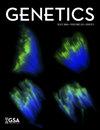Genomic evidence of paternal genome elimination in the globular springtail Allacma fusca
IF 3.3
3区 生物学
引用次数: 5
Abstract
Paternal genome elimination (PGE) - a type of reproduction in which males inherit but fail to pass on their father’s genome - evolved independently in six to eight arthropod clades. Thousands of species, including several important for agriculture, reproduce via this mode of reproduction. While PGE is well established in some of the clades, the evidence in globular springtails (Symphypleona) remains elusive, even though they represent the oldest and most species rich clade putatively reproducing via PGE. We sequenced genomic DNA from whole bodies of Allacma fusca males with high fractions (>27.5%) of sperm to conclusively confirm that all the sperm carry one parental haplotype only. Although it is suggestive that the single haplotype present in sperm is maternally inherited, definitive genetic proof of the parent of origin is still needed. The genomic approach we developed allows for detection of genotypic differences between germline and soma in all species with sufficiently high fraction of germline in their bodies. This opens new opportunities for scans of reproductive modes in small organisms.球状春尾Allacma fusca父系基因组消除的基因组证据
父系基因组消除(PGE)是一种雄性遗传但无法遗传父亲基因组的繁殖方式,在六到八个节肢动物分支中独立进化。成千上万的物种,包括一些对农业很重要的物种,通过这种繁殖方式繁殖。虽然PGE在一些分支中已经得到了很好的证实,但球状弹尾虫(Symphypleona)的证据仍然难以捉摸,尽管它们代表了被认为通过PGE繁殖的最古老、物种最丰富的分支。我们对精子比例较高(>27.5%)的鹅膏虫雄性全身的基因组DNA进行了测序,以最终确认所有精子只携带一个亲本单倍型。尽管这表明精子中存在的单一单倍型是母系遗传的,但仍需要明确的遗传证据来证明其来源。我们开发的基因组方法可以检测所有体内种系比例足够高的物种的种系和胞体之间的基因型差异。这为扫描小生物体的繁殖模式开辟了新的机会。
本文章由计算机程序翻译,如有差异,请以英文原文为准。
求助全文
约1分钟内获得全文
求助全文
来源期刊

Genetics
生物-遗传学
CiteScore
6.20
自引率
6.10%
发文量
177
期刊介绍:
GENETICS is published by the Genetics Society of America, a scholarly society that seeks to deepen our understanding of the living world by advancing our understanding of genetics. Since 1916, GENETICS has published high-quality, original research presenting novel findings bearing on genetics and genomics. The journal publishes empirical studies of organisms ranging from microbes to humans, as well as theoretical work.
While it has an illustrious history, GENETICS has changed along with the communities it serves: it is not your mentor''s journal.
The editors make decisions quickly – in around 30 days – without sacrificing the excellence and scholarship for which the journal has long been known. GENETICS is a peer reviewed, peer-edited journal, with an international reach and increasing visibility and impact. All editorial decisions are made through collaboration of at least two editors who are practicing scientists.
GENETICS is constantly innovating: expanded types of content include Reviews, Commentary (current issues of interest to geneticists), Perspectives (historical), Primers (to introduce primary literature into the classroom), Toolbox Reviews, plus YeastBook, FlyBook, and WormBook (coming spring 2016). For particularly time-sensitive results, we publish Communications. As part of our mission to serve our communities, we''ve published thematic collections, including Genomic Selection, Multiparental Populations, Mouse Collaborative Cross, and the Genetics of Sex.
 求助内容:
求助内容: 应助结果提醒方式:
应助结果提醒方式:


